大家的日语1到8课语法综合练习
大家的日语练习题
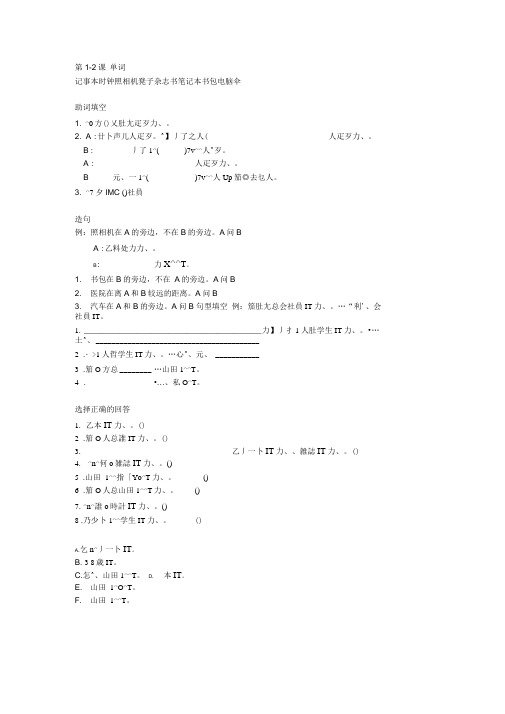
第1-2课单词记事本时钟照相机凳子杂志书笔记本书包电脑伞助词填空1. ^0方()乂肚尢疋歹力、。
2. A :廿卜声儿人疋歹。
^】丿了之人( 人疋歹力、。
B : 丿了1^( )7v^^人^歹。
A : 人疋歹力、。
B 元、一1^( )7v^^人Up笳◎去乜人。
3. ^7 夕IMC ()社員造句例:照相机在A的旁边,不在B的旁边。
A问BA :乙料处力力、。
^^T。
B: 力X1. 书包在B的旁边,不在A的旁边。
A问B2. 医院在离A和B较远的距离。
A问B3. 汽车在A和B的旁边。
A问B 句型填空例:笳肚尢总会社員IT力、。
…“利'、会社員IT。
1.________________________________________ 力】丿扌1人肚学生IT力、。
•…土^、_________________________________________2.・>1人哲学生IT力、。
…心^、元、 ___________3.笳O方总________ …山田1^^T。
4. _________ •…、私O^T。
选择正确的回答1.乙本IT力、。
()2.笳O人总誰IT力、。
()3.乙丿一卜IT力、、雑誌IT力、。
()4.^n^何o雑誌IT力、。
()5.山田1^^指「Yo^T力、。
()6.笳O人总山田1^^T力、。
()7. ^n^誰o時計IT力、。
()8 .乃少卜1^^学生IT力、。
()A.乞n^丿一卜IT。
B. 3 8歳IT。
C.怎^、山田1^^T。
D.本IT。
E. 山田1^O^T。
F. 山田1^^T。
G. 、先生H. 自動車①雑誌^ToI.选择题例:本IT。
1.^n^{^n,何}①力^y^r^o-{^^L,^^Lo}^To2.{^o,^n}^何①亍一力、。
…日本語o^-y^To3.乙料总笳肚尢o力、老'^T力、。
…心^、元、{笳肚尢,初尢》}OCp笳◎去乜人。
4.^n^{新聞,何}^T力、。
•…比^、乞料总新聞^To5 .笳O人总{何,疋料}IT力、。
大家的日语pdf第8课后附语法讲解
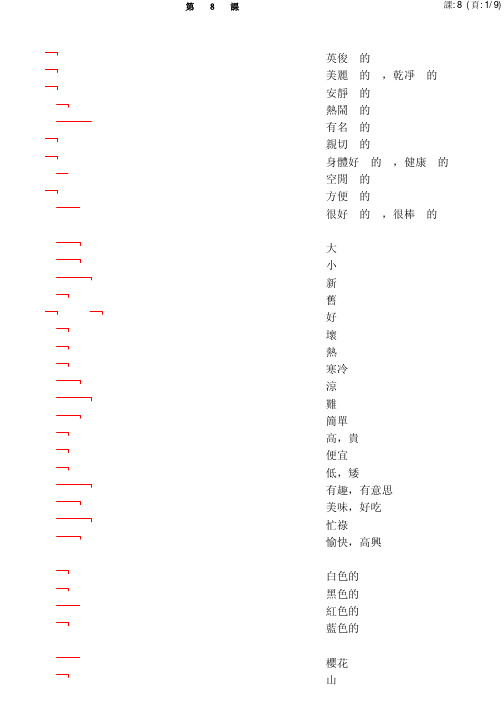
而且,還用(用於接續句子) ,但是
你好嗎? 是呀(用於思考回答時)。
你習慣日本的生活了嗎?
再來一杯
怎麼樣?
不用了,夠了。
已經 了吧 不是嗎? 。
我該告辭了。
歡迎再來。
富士山,日本最高的山 琵琶湖,日本最大的湖 上海 七名武士 ,黑澤明導演的電影 金閣寺
課:8 (頁:3/9)
課:8 (頁:4/9)
-2-
⑦接續助詞「が」 「が」是接續助詞,是“但是”的意思。兩個句子由「が」連接成為一個句子。
⑮日本の食べ物はおいしいですが、高いです。
⑧疑問詞「どれ」 這個疑問詞,是要求從具體提出的三件以上物品中特定出一個的用法。
⑯ミラーさんの傘はどれですか。 …あの青い傘です。
※一般如果是要二選一的話,我們習慣使用「どちら」這個疑問詞。 ・野菜と肉とどちらが好きですか。
()
形容詞( )
「 形容詞(~ ) 」的否定形,是去掉最後的「 」加上「
」。
這本書沒意思。
的否定形是
。
形容詞句的疑問句形式,也和名詞句動詞句相同。回答時要重複疑問句中的形容
詞。不能用「
」「
」來回答。
北京冷嗎?
…是的,很冷。
琵琶湖的湖水很乾淨嗎?
…不,不乾淨。
課:8 (頁:9/9)
3
形容詞
名詞
形容詞
意見和感想的句子。
日本的生活怎麼樣?
…很愉快。
6
名詞 1
名詞 2
要求就名詞1進行描和說明時用這個疑問句。名詞2是名詞1所屬的範疇。「
」應放在名詞前。
奈良是什麼樣的城市?
…是古老的城市。
7
句子 1 、句子 2
《大家的日语1》第一课测试练习卷

《大家的日语1》第一课测试练习卷《大家的日语》第1課はじめましてテストI.単語(日中対訳)我<名> ________________________先生、女士、同志<接尾> ________________学生<名> ________________________公司职员<名> ________________________你,您<名> ________________________是、对<感> ________________________不、不是<感> ________________________银行职员<名> ________________________医生<名> ________________________ 他、她、那个人<名> ______________________哪位<名> ________________________大学<名> ________________________樱花大学<名> ________________________老师<名> ________________________代替<接尾> ________________________几岁<名> ________________________9<数> ________________________一岁<助数> ________________________美国<名> ________________________中国<名> ________________________~人<接尾> ________________________中国人<名> ________________________教师<名> ________________________他、她、那个人<名> ______________________谁<名> ________________________IMC公司<名> ________________________公司的职员<名> ________________________富士大学<名> ________________________巴西<名> ________________________8岁<助数> ________________________多大岁数<名> ________________________日本<名> ________________________英国<名> ________________________泰国<名> ________________________德国<名> ________________________亚洲研究中心<名> ______________________研究人员<名> ________________________神户<名> ________________________ 医院<名> ________________________神户医院<名> ________________________巴西航空<名> ________________________印度<名> ________________________韩国<名> ________________________印度尼西亚<名> ________________________动力电气公司<名> ______________________ ------------------------------------------------------------------------------------------- II. <練習C>初次见面。
大家的日语1—50课练习B答案-推荐下载
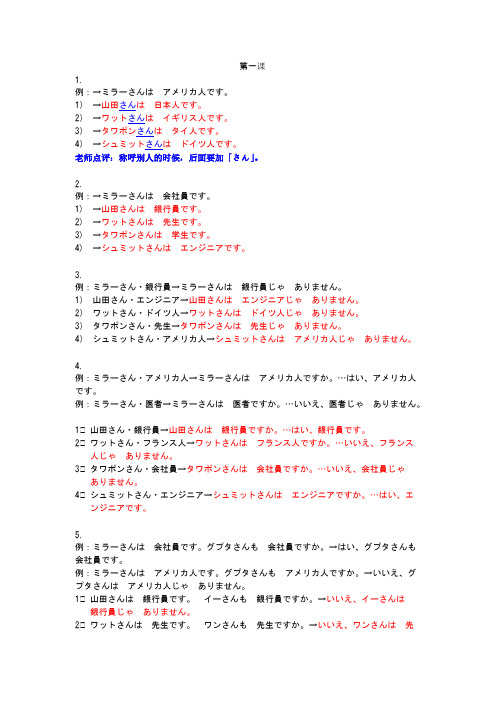
第一课1.例:→ミラーさんは アメリカ人です。
1)→山田さんは 日本人です。
2)→ワットさんは イギリス人です。
3)→タワポンさんは タイ人です。
4)→シュミットさんは ドイツ人です。
老师点评:称呼别人的时候,后面要加「さん」。
2.例:→ミラーさんは 会社員です。
1)→山田さんは 銀行員です。
2)→ワットさんは 先生です。
3)→タワポンさんは 学生です。
4)→シュミットさんは エンジニアです。
3.例:ミラーさん・銀行員→ミラーさんは 銀行員じゃ ありません。
1)山田さん・エンジニア→山田さんは エンジニアじゃ ありません。
2)ワットさん・ドイツ人→ワットさんは ドイツ人じゃ ありません。
3)タワポンさん・先生→タワポンさんは 先生じゃ ありません。
4)シュミットさん・アメリカ人→シュミットさんは アメリカ人じゃ ありません。
4.例:ミラーさん・アメリカ人→ミラーさんは アメリカ人ですか。
…はい、アメリカ人です。
例:ミラーさん・医者→ミラーさんは 医者ですか。
…いいえ、医者じゃ ありません。
1、山田さん・銀行員→山田さんは 銀行員ですか。
…はい、銀行員です。
2、ワットさん・フランス人→ワットさんは フランス人ですか。
…いいえ、フランス人じゃ ありません。
3、タワポンさん・会社員→タワポンさんは 会社員ですか。
…いいえ、会社員じゃ ありません。
4、シュミットさん・エンジニア→シュミットさんは エンジニアですか。
…はい、エンジニアです。
5.例:ミラーさんは 会社員です。
グプタさんも 会社員ですか。
→はい、グプタさんも 会社員です。
例:ミラーさんは アメリカ人です。
グプタさんも アメリカ人ですか。
→いいえ、グプタさんは アメリカ人じゃ ありません。
1、山田さんは 銀行員です。
イーさんも 銀行員ですか。
→いいえ、イーさんは 銀行員じゃ ありません。
2、ワットさんは 先生です。
ワンさんも 先生ですか。
→いいえ、ワンさんは 先生じゃ ありません。
大家的日语 第一册 1-10课日语练习题

1,写出下列单词的当用汉字(10分)でんちほんやそとあいだのみものじょうずようじやくそくりょうしごとにもつきっぷくだものみずいまやすみとけいつくえざっしけんきゅうしゃ2,写出下列单词的假名(10分)病院医者韓国鉛筆自動車新聞手帳昼図書館銀行紅茶肉国庭所町食べ物便利山富士山3,写出下列单词的反义词。
(10分)静か寒い忙しい白い大きい親切難しい高い古い悪い4,填写助词。
(14分)①日本の生活()なれました。
②どこ()いきますか。
③私()えいが()すきです。
④どんなスポーツ()じょうずですか。
何()じょうずではありません。
⑤会社は5時()おわります。
⑥田中さんの家族は大阪()います。
⑦時間がありません()タクシー()いきましょう。
⑧中国じんははし()ごはんをたべます。
⑨鞄のなかにほん()かぎなどがあります。
⑩学校()ほんをもらいました。
⑪このとけいはどこ()かいましたか。
⑫私はタイ語()わかりません。
⑬東京のちかてつはきれいです。
()べんりです。
⑭桜はきれい()はなです。
5,翻译句子。
(40)①田中先生喜欢唱歌。
②你吃过午饭了吗。
③昨天因为太忙了所以哪里都没有去。
④她英语非常好。
⑤我们一起喝杯咖啡怎么样。
⑥我今天有事,所以要早点回去。
⑦学校食堂的东西又便宜有好吃。
⑧她虽然很飘亮但是太冷漠了,我不喜欢。
⑨北京的冬天很冷。
⑩东京是一个非常繁华的城市。
⑪インドネシアはあついくにですか。
⑫にほんのたべものはどうですか。
とてもおいしいです。
⑬どうしてきのうはやくかえりましたか。
つまのたんじょうびですから。
⑭いいシャツですね。
これですか、母にあげます。
⑮どうしてビールをのみませんか。
きらいですから。
6,阅读文章,回答问题。
(16)田中さんは35さいです。
IMCのしゃいんです。
しごとはげつようびからきんようびまでです。
ときどきどようびもしごとです。
かいしゃはいそがしいですから、ひまなじかんがあまりありませんが、かいしゃのひとはとてもしんせつですから、このしごとがすきです。
大家的日语初级1课练习题试卷附答案
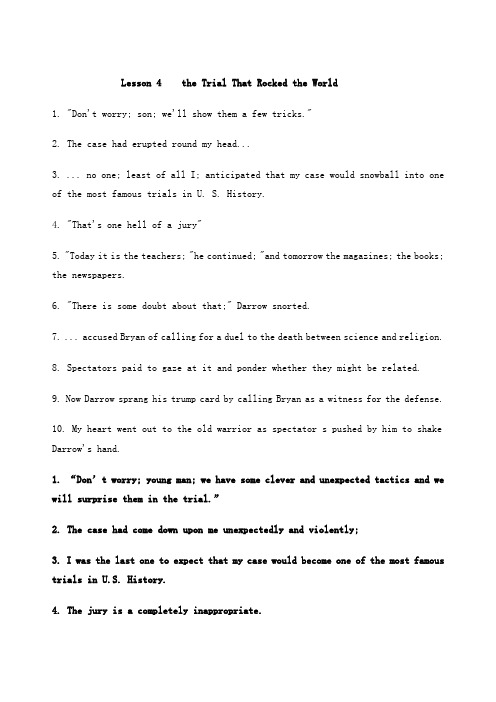
Lesson 4 the Trial That Rocked the World1. "Don't worry; son; we'll show them a few tricks."2. The case had erupted round my head...3. ... no one; least of all I; anticipated that my case would snowball into one of the most famous trials in U. S. History.4. "That's one hell of a jury"5. "Today it is the teachers; "he continued; "and tomorrow the magazines; the books; the newspapers.6. "There is some doubt about that;" Darrow snorted.7. ... accused Bryan of calling for a duel to the death between science and religion.8. Spectators paid to gaze at it and ponder whether they might be related.9. Now Darrow sprang his trump card by calling Bryan as a witness for the defense.10. My heart went out to the old warrior as spectator s pushed by him to shake Darrow's hand.1. “Don’t worry; young man; we have some clever and unexpected tactics and we will surprise them in the trial.”2. The case had come down upon me unexpectedly and violently;3. I was the last one to expect that my case would become one of the most famous trials in U.S. History.4. The jury is a completely inappropriate.5. Today the teachers are put on trial because they teach scientific theory; soon the newspapers and magazines will not be allowed to spread knowledge of science.6. “It is doubtful whether man has reasoning power;” said Darrow sarcastically and scornfully.7. ... accused Bryan of demanding that a life or death struggle be fought between science and religion.8. People had to pay in order to have a look at the ape and to consider carefully whether apes and humans could have a common ancestry.9. Darrow surprised everyone by asking for Bryan as a witness for Scopes which was a brilliant idea.10. I felt sorry for Bryan as the spectators rushed past him to congratulate Darrow.Unit 6 Mark Twain --- Mirror of America1. Mark Twain is known to most Americans as the author of The Adventures ofTom Sawyer and The Adventures of Huckleberry Finn. Huck Finn is noted for his simple and pleasant journey through his boyhood which seems eternal and Tom Sawyer is famous for his free roam of the country and his adventure in one summer which seems never to end.2. His work on the boat made it possible for him to meet a large variety of people. It is a world of all types of characters.3. All would reappear in his books; written in the colorful language that he seemed to be able to remember and record as accurately as a phonograph.4. Steamboat decks were filled with people of pioneering spirit and also lawless people or social outcasts such as hustlers; gamblers and thugs.5. He went west to Nevada by a horse-pulled public vehicle; following the flow of people in the gold and silver rush.6. Mark Twain began to work hard as a newspaper reporter and humorist to become well-known locally.7. Those who came pioneering out west were energetic; courageous and reckless people; because those who stayed at home were the slow; dull and lazy people.8. That’s typical of California.9. If we relaxed; rested or stayed away from all this crazy struggle for success occasionally and kept the daring and enterprising spirit; we would be able to remain strong and healthy and continue to produce great thinkers.10. At the end of his life; he lost the last bit of his positive view of man and the world.Unit 9 “A More Perfect Union”The document they produced was eventually signed but ultimately unfinished.P1: After heated debate and compromises; the Constitution was finally adopted by the Constitutional Convention and 39 out of 55 delegates signed the document. But the “three-fifths” clause and the twenty years allowed for the slave trade showed the slave issue was not solved; so the process of forming a more perfect union did not end with the enforcement of the Constitution.But it also comes from my own story.P2: My personal background and my success story; rising from rags to riches; alsoteaches me the importance of unity.But it is a story that has seared into my genetic makeup the idea that this nation is more than the sum of its part-that out of many; we are truly one.P3: I am deeply ingrained; through my experience in the United States; with the idea that America is not a total of adding everything together but is the product of fusion; of sharing the same creed.Throughout the first year of this campaign; against all predictions to the contrary; we saw how hungry the American people were for this message of unity.P4: In spite of all announcements that America was not ready for a black president; that I would fail in the campaign; we gained momentum in the first year of the campaign; which showed that the American people demanded unity and change. Despite the temptation to view my candidacy through a purely racial lens; we won commanding victories in states with some of the whitest populations in the country. P5: People were encouraged to judge me from the perspective of a black candidate; raising the question of whether the United State would fare better with a black president. However; we won great victories even in some of the more conservative states; with stronger racial bias.We saw racial tensions bubble to the surface during the week before the South Carolina primary.P6: The week before the Democrats were to select their delegates to the national convention in South Carolina; attacks on me; on blacks became more frequent; more intense.On one end of the spectrum; we’ve heard the implication that my candidacy is somehow an exercise in affirmative action; that it’s based solely on desire of wide-eyed liberals to purchase racial reconciliation on the cheap.P7: At one end of the entire range of opinion; there are people who say that I decided to run because I wanted to show black and white should have equal opportunity and I wanted to play on the desires of na ve liberals to achieve racial harmony without making great effort.I can no more disown him than I can disown the black community.P8: It is impossible for me to cast him off just as it is impossible for me to repudiate the black community.Unit 1 Pub Talk and the King's English1. And it is an activity only of humans. para 1并且它是人类特有的一种活动..1.And conversation is an activity which is found only among human being.2. Conversation is not for making a point. para 2交谈并不是为了表明一种看法..2.Conversation is not for persuading others to accept our idea or point of view.3. In fact; the best conversationalists are those who are prepared to lose. para 2实际上;最好的交谈者;是那些准备输的人..3.In fact a person who really enjoys and is skilled at conversation will not argue to win or force others to accept his point of view.4. Bar friends are not deeply involved in each other's lives. para 3酒吧友人没有深层次地涉及彼此的生活..4.People who meet each other for a drink in the bar of a pub are not intimate friends for they are not deeply absorbed or engrossed in each other’s lives.5. it could still go ignorantly on para 6大伙仍旧可以糊里糊涂地扯下去..5. The conversation could go on without anybody knowing who was right or wrong.6. They are cattle in the fields; but we sit down to beef boeuf. para 9地里放牧着的牛叫cattle;席上吃的牛肉则叫beef..6.These animals are called cattle when they are alive and feeding in the fields;but when we sit down at the table to eat.we call their meat beef.7. The new ruling class had built a cultural barrier against him by building their French against his own language. para11新的统治阶级用法语来对抗其他语言;这样就建立起了对抗这些农民的文化壁垒..7. The new ruling class by using French instead of English made it difficult for the English to accept or absorb the culture of the rulers.8. English had come royally into its own. para 13英语取得了国语的地位..8.The English language received proper recognition and was used by the King once more.9. The phrase has always been used a little pejoratively and even facetiously by the lower classes. para 15下层阶级使用这个短语时;常带有贬义;甚至讥讽的味道..9.The phrase;the King’s English;has always been used disre spectfully and jokingly by the lower classesor: The working people very often make fun of the proper and formal language of the educated people.10. The rebellion against a cultural dominance is still there. para 15对文化支配的对抗仍然存在..10.There still exists in the working people;as in the early Saxon peasants;a spirit of opposition to the cultural authority of the ruling class.11. There is always a great danger; as Carlyle put it; that "words will harden into things for us. " para 16正如卡莱尔提出的;“对我们而言;词语会变成具体的事物”;这始终会有极大的危险.. 11. There is always a great danger that we might forget that words are only symbols and take them for things they are supposed to represent.For example;the word “dog” is a symbol representing a kind of animal.We mustn’t regard the word “dog” as being the animal itself.Lesson 2 Marrakech1. The burying-ground is merely a huge waste of hummocky earth; like a derelict building-lot.2. All colonial empires are in reality founded upon that fact.3. They rise out Of the earth; they sweat and starve for a few years; and then they sink back into the nameless mounds of the graveyard para 34. A carpenter sits cross legged at a prehistoric lathe; turning chair-legs at lightning speed.5. Instantly; from the dark holes all round; there was a frenzied rush of Jews.6. every one of them looks on a cigarette as a more or less impossible luxury7. Still; a white skin is always fairly conspicuous. para 168. In a tropical landscape one's eye takes in everything except the human beings.9. No one would think of running cheap trips to the Distressed Areas.10. for nine-tenths of the people the reality of life is an endless; backbreaking struggle to wring a little food out of an eroded soil para 1711. She accepted her status as an old woman; that is to say as a beast of burden.12. People with brown skins are next door to invisible. para 2113. Their splendid bodies were hidden in reach-me-down khaki uniforms14. How long before they turn their guns in the other direction para 2515. Every white man there had this thought stowed somewhere or other in his mind.1.The burying-ground is nothing more than a huge piece of wasteland full of mounds of earth looking like a deserted and abandoned piece of land on which a building was going to be put up.2. All the imperialists build up their empires by treating the people in the colonies like animals by not treating the people in the colonies as human beings.3. They are born. Then for a few years they work; toil and starve. Finally they die and are buried in graves without a name.4. Sitting with his legs crossed and using a very old-fashioned lathe; a carpenter quickly gives a round shape to the chair-legs he is making.5. Immediately from their dark hole-like cells everywhere a great number of Jews rushed out wildly excited.6. Every one of these poor Jews looked on the cigarette as a piece of luxury which they could not possibly afford.7. However; a white-skinned European is always quite noticeable.8. If you take a look at the natural scenery in a tropical region; you see everything but the human beings.9. No one would think of running cheap trips to the Distressed Areas.No one would think of organizing cheap trips for the tourists to visit the poor slum areas for these trips would not be interesting.10. Life is very hard for ninety percent of the people. With hard backbreaking toil they can produce a little food on the poor soil.11. She took it for granted that as an old woman she was the lowest in the community;that..she was only fit for doing heavy work like an animal.12 .People with brown skins are almost invisible.13. The Senegalese soldiers were wearing ready-made khaki uniforms which hid their beautiful well-built bodies.14. How much longer before they turn their guns around and attack us ..15 Every white man;the onlookers;the officers on their horses and the white N.C.Os.marching with the black soldiers;had this thought hidden somewhere or other in his mind.。
大家的日语练习卷 1-19课

中船澄西日语进修班2月度测验C卷班级 姓名得分 一、平假名与片假名互换。
请将下列平を1.课长2.入口3.南4.登る 5.大丈夫6.结婚7.台所8.留学生9.持って来る 10.手纸11.川 12.心配 13.外国 14.地図 15.玄関16.兄弟 17.资料 18.吃茶店 19.扫除 20.国际21.船便 22.运転 23.书留 24.残业 25.辛い26.上着 27.塩 28.短い 29.四、将下列平假名写出日文汉字。
1.コンビニ2.ベランダ3.エアメール4.エアコン5.ケーキ6.ビル7.レポート8.パスポート六、中译日。
(1×10)1.我一周洗两次澡。
2.小李明天想和女朋友碰面。
3.大学毕业后,我成为了老师。
4.孩子必须每天吃早饭。
5.来日本前,我懂一点儿日语。
6.曾经在日本待过三年。
7.不把食物放进冰箱也可以。
8.请不要忘记钥匙。
9.便利店能够复印。
10.请写下你的护照编号。
七、日译中。
(1×10)1.しんごうをひだりへまがらないでく2.3.4.5.6.7.8.9.10.から、()とおいです。
2、にほん()留学し()いきます。
3、ほんや()はやな()间()公园があります。
4、一时间()まえに、あめ()ふっていました。
5、ビール()ジュース()どちら()すきですか。
どちら()すきです。
6、おおさか()东京()ひこうき()一时间()かかります。
7、中国は日本()ずっと広いです。
8、まいばんしゅじん()公园()さんぽしています。
九、会话练习。
(20)。
大家的日语①语法(第一到二十五课全)
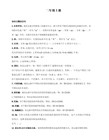
三、全盤否定=疑問句+も+否定
机の上 に 何 も ありません。
教室 に 誰 も いません。
雜記:“と”是用在兩個中的,“~や~「など」(~和~【等】)”是用在兩個以上的。
第十一課
【第十一課的筆記幾乎沒有,主要是個數量詞問題,參見課本P.176頁就可以了】
椅子のした に 猫 が 三匹 います。
クラス で 王さん は 一番(いちばん) ハンサム です。(で在這裡是副詞,表範圍)
教室 に 一番 前 に 誰 ですか。
四、どちら (哪一個【兩者間的選擇】)
A:王さんと 許さんと どちら が 好き ですか。B:どちらも(兩個都) 好き です。
第十三課
一、名が 欲しい です(想要。。。)
(私は)彼女 が 欲しい です。
何が 欲しい ですが。 | 一番 欲しい 物 は 何 ですか。
二、動詞 たい です (想干、做。。。【動詞ます連用形】)
とても 疲れました から 休み たい です。
特殊:母 に 会いたい
何 を し たい ですか。 【注意し,是從します變來的】
②ナ形容詞 です===でした
例:簡単です===簡単でした
③名詞【名詞在使用上和ナ形容詞有很多相似處,這裡也是一樣】
去年 私 は 学生 でした。
二、用於比較的副詞——より
この本 は その本 より おもしろい です。
去年の夏 は 今年の夏 より 暑かった です。
三、いちばん(最、第一)
2、一段て形(和變ます形一樣)
例:寝る===寝て、見る===見て、起きる===起きて
3、サ変て形
例:する==して、勉強する===勉強して
大家的日语练习题

第1-2课单词记事本时钟照相机凳子杂志书笔记本书包电脑伞助词填空1.あの方()どなたてすか。
2.A:サントスさんはブラジル人です。
マリアさん()ブラジル人ですか。
B:はい、マリアさん()ブラジル人です。
A:ミラーさん()ブラジル人ですか。
B:いいえ、ミラーさん()ブラジル人じゃありません。
3.グブタさんはIMC()社員です。
造句例:照相机在A的旁边,不在B的旁边。
A问BA:これはカメラですか。
B:はい、それはカメラです。
1.书包在B的旁边,不在A的旁边。
A问B2.医院在离A和B较远的距离。
A问B3.汽车在A和B的旁边。
A问B句型填空例:あなたは会社員ですか。
…はい、会社員です。
1.カリナさんは学生ですか。
…はい、______2.ワンさんも学生ですか。
…いいえ、______3.あの方は_____…山田さんです。
4.これは_____…はい、私のです。
选择正确的回答1.これは本ですか。
()2.あの人は誰ですか。
()3.これはノートですか、雑誌ですか。
()4.それは何の雑誌ですか。
()5.山田さんはおいくつですか。
()6.あの人は山田さんですか。
()7.これは誰の時計ですか。
()8.ワットさんは学生ですか。
()A.それはノートです。
B.38歳です。
C.はい、山田さんです。
D.はい、それは本です。
E.山田さんのです。
F.山田さんです。
G.いいえ、先生です。
H.自動車の雑誌です。
I.はい、わたしのです。
选择题例:{この,これ}は本です。
1.それは{だれ,何}のカバンですか。
…{わたし,わたしの}です。
2.{その,それ}は何のテープですか。
…日本語のテープです。
3.これはあなたのかぎですか。
…いいえ、{あなた,わたし}のじゃありません。
4.これは{新聞,何}ですか。
…はい、それは新聞です。
5.あの人は{何,だれ}ですか。
…佐藤さんです。
6.太郎君は{だれ,何歳}ですか。
…8歳です。
读数字1.グプタさんは42歳です。
标准日本语1-8课练习
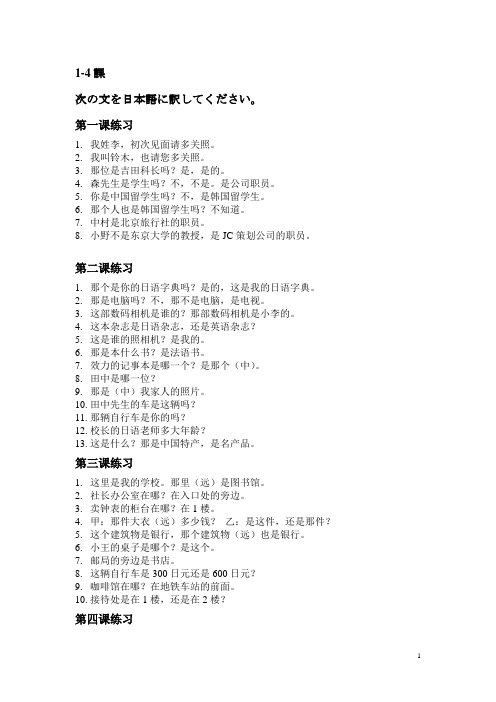
1-4課次の文を日本語に訳してください。
第一课练习1.我姓李,初次见面请多关照。
2.我叫铃木,也请您多关照。
3.那位是吉田科长吗?是,是的。
4.森先生是学生吗?不,不是。
是公司职员。
5.你是中国留学生吗?不,是韩国留学生。
6.那个人也是韩国留学生吗?不知道。
7.中村是北京旅行社的职员。
8.小野不是东京大学的教授,是JC策划公司的职员。
第二课练习1.那个是你的日语字典吗?是的,这是我的日语字典。
2.那是电脑吗?不,那不是电脑,是电视。
3.这部数码相机是谁的?那部数码相机是小李的。
4.这本杂志是日语杂志,还是英语杂志?5.这是谁的照相机?是我的。
6.那是本什么书?是法语书。
7.效力的记事本是哪一个?是那个(中)。
8.田中是哪一位?9.那是(中)我家人的照片。
10.田中先生的车是这辆吗?11.那辆自行车是你的吗?12.校长的日语老师多大年龄?13.这是什么?那是中国特产,是名产品。
第三课练习1.这里是我的学校。
那里(远)是图书馆。
2.社长办公室在哪?在入口处的旁边。
3.卖钟表的柜台在哪?在1楼。
4.甲:那件大衣(远)多少钱?乙:是这件,还是那件?5.这个建筑物是银行,那个建筑物(远)也是银行。
6.小王的桌子是哪个?是这个。
7.邮局的旁边是书店。
8.这辆自行车是300日元还是600日元?9.咖啡馆在哪?在地铁车站的前面。
10.接待处是在1楼,还是在2楼?第四课练习1.房间里有录像机吗?不,这个房间里没有,旁边的房间里有。
2.院子里有谁?有森先生和小野。
3.日语老师在办公室吗?不,办公室里一个人都没有。
4.起居室里有什么?有猫和狗。
5.会议室在哪?在3楼。
6.这是你的笔记本电脑吧?是,是我的。
7.站前有个百货商店吧?是的,(应该)有吧。
8.箱子里有什么?有我的眼镜。
9.这附近有小卖店吗?对不起,不知道。
10.起居室里有父母和客人(お客さん)。
第五课练习1.我的生日是1986年6月9日。
2.2008年8月8日,在北京举办了奥运会。
大家的日本语练习题

一.量词
二.时间
三.翻群
【杀寸形】
一起喝茶好喝?
5黠兄吧。
我想黄照相械。
我去看重影。
叫出租隼吧?
穴形】
瞿寸不起,言青把圜珠肇借幺合我。
山田君正在和七他魔法少女交音炎。
(魔法少女豺”LHS)可以在道狸吸!®喝?
在美秫诒官不能拍照。
工作完了后去游泳。
早上慢跑,冲淋浴,然彳爰去公司。
把善借幺合工藤新一。
言青仁太带我去了秘密基地。
(秘密基地。
^0^J 山田用隼送了我。
【笈1'形】
在道桂遒拍照。
必须出示^照。
不脱鞋也可以。
【辞善形】
我曾弹^琴。
我的爱好是重重。
睡受前看害。
选形】
去谩北海道。
休息日寺,打打怪默,拯救世界。
(毛〉久夕一)(殴马)(救5)
【普通形】
我觉得家人最重要。
哥哥说十点之前回来。
明天的聚会你去参加吧?
他是美国人吧?
这是我做的蛋糕。
看报纸时戴眼镜。
有个人电脑的话,很方便。
即使查了字典,意思也不明白。
即使不喜欢也得吃。
她即使星期天也工作。
《大家的日语》1-6课试题
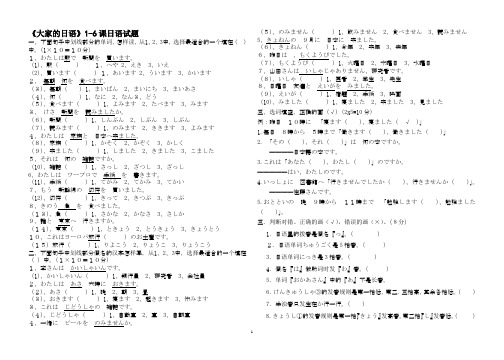
《大家的日语》1-6课日语试题一、下面句子中划线部分的单词,怎样读,从1、2、3中,选择最适合的一个填在()中。
(1×10=10分)1、わたしは駅で新聞を買います。
(1)、駅()1、へや 2、えき3、いえ(2)、買います()1、あいます 2、ういます3、かいます2、毎朝何を食べます。
(3)、毎朝()1、まいばん2、まいにち3、まいあさ(4)、何()1、なに2、なん3、どう(5)、食べます()1、よみます2、たべます3、みます3、けさ新聞を読みましたか。
(6)、新聞()1、しんぶん2、しぶん3、しぶん(7)、読みます()1、のみます2、ききます3、よみます4、わたしは家族と日本へ来ました。
(8)、家族()1、かそく2、かぞく3、かしく(9)、来ました()1、しました2、きました3、こました5、それは何の雑誌ですか。
(10)、雑誌()1、さっし2、ざつし3、ざっし6、わたしはワープロで手紙を書きます。
(11)、手紙()1、てがみ2、てかみ3、てかい7、もう新幹線の切符を買いました。
(12)、切符()1、きって2、きつぷ3、きっぷ8、きのう魚を食べました。
(13)、魚()1、さかな2、かなさ3、さしか9、誰と東京へ行きますか。
(14)、東京()1、ときょう2、とうきょう3、きょうとう10、これはヨーロパ旅行()のお土産です。
(15)旅行()1、りよこう2、りょうこ3、りょうこう二、下面句子中划线部分假名的汉字怎样写,从1、2、3中,选择最适合的一个填在()中。
(1×10=10分)1、李さんはかいしゃいんです。
(1)、かいしゃいん()1、銀行員2、研究者3、会社員2、わたしはあさ六時におきます。
(2)、あさ()1、晩2、朝3、昼(3)、おきます()1、寝ます2、起きます3、休みます3、これはじどうしゃの雑誌です。
(4)、じどうしゃ()1、自動車2、車3、自転車4、一緒にビールをのみませんか。
大家的日语①语法(第一到二十五课全)
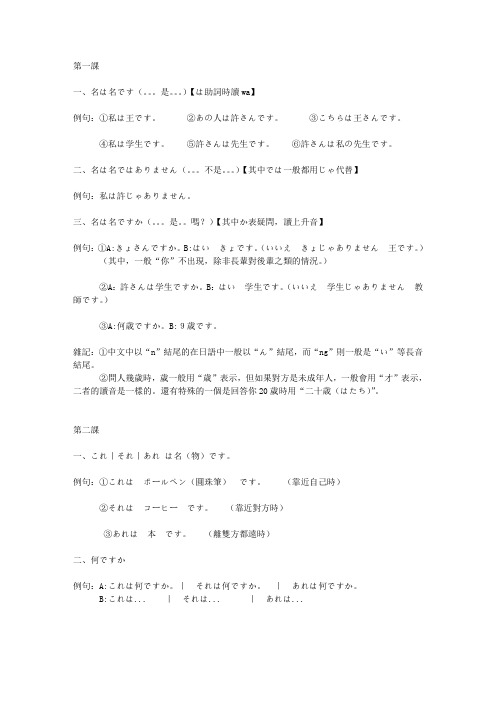
第一課一、名は名です(。
是。
)【は助詞時讀wa】例句:①私は王です。
②あの人は許さんです。
③こちらは王さんです。
④私は学生です。
⑤許さんは先生です。
⑥許さんは私の先生です。
二、名は名ではありません(。
不是。
)【其中では一般都用じゃ代替】例句:私は許じゃありません。
三、名は名ですか(。
是。
嗎?)【其中か表疑問,讀上升音】例句:①A:きょさんですか。
B:はいきょです。
(いいえきょじゃありません王です。
)(其中,一般“你”不出現,除非長輩對後輩之類的情況。
)②A:許さんは学生ですか。
B:はい学生です。
(いいえ学生じゃありません教師です。
)③A:何歳ですか。
B:9歳です。
雜記:①中文中以“n”結尾的在日語中一般以“ん”結尾,而“ng”則一般是“い”等長音結尾。
②問人幾歲時,歲一般用“歳”表示,但如果對方是未成年人,一般會用“才”表示,二者的讀音是一樣的。
還有特殊的一個是回答你20歲時用“二十歳(はたち)”。
第二課一、これ|それ|あれは名(物)です。
例句:①これはポールペン(圓珠筆)です。
(靠近自己時)②それはコーヒーです。
(靠近對方時)③あれは本です。
(離雙方都遠時)二、何ですか例句:A:これは何ですか。
|それは何ですか。
|あれは何ですか。
B:これは... |それは... |あれは...三、これは許さんのコーヒーですこの(その|あの)コーヒーは許さんのです。
(注意後面的一個の)このコーヒーは許さんのじゃありません。
四、誰(だれ)このコーヒーは誰のですか。
(注意後面的一個の)雜記:これ|それ|あれ為代詞,この|その|あの後面需要加名詞。
第三課一、ここ|そこ|あそこは名(場所)です。
ここ|そこ|あそこは教室です。
二、名(場所)はここ|そこ|あそこです。
教室はここです。
会社は大阪です。
(公司在大阪)私はここです。
(我在這裡)四、どこ(哪裡)教室はどこですか。
五、いくら(多少、多少錢)A:この本はいくらですか。
(备考辅导)《大家的日语1》语法整理1b
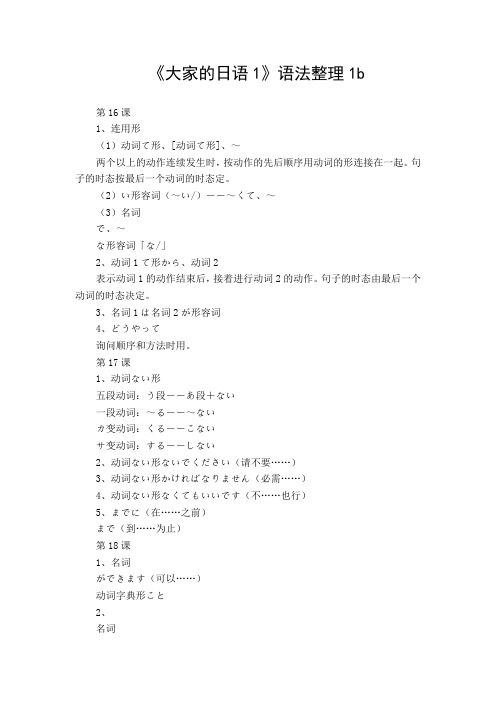
《大家的日语1》语法整理1b
第16课
1、连用形
(1)动词て形、[动词て形]、~
两个以上的动作连续发生时,按动作的先后顺序用动词的形连接在一起。
句子的时态按最后一个动词的时态定。
(2)い形容词(~い/)――~くて、~
(3)名词
で、~
な形容词「な/」
2、动词1て形から、动词2
表示动词1的动作结束后,接着进行动词2的动作。
句子的时态由最后一个动词的时态决定。
3、名词1は名词2が形容词
4、どうやって
询问顺序和方法时用。
第17课
1、动词ない形
五段动词:う段――あ段+ない
一段动词:~る――~ない
カ变动词:くる――こない
サ变动词:する――しない
2、动词ない形ないでください(请不要……)
3、动词ない形かければなりません(必需……)
4、动词ない形なくてもいいです(不……也行)
5、までに(在……之前)
まで(到……为止)
第18课
1、名词
ができます(可以……)
动词字典形こと
2、
名词
私の趣味はがです(我的爱好是……)
动词字典形こと
3、动词1字典形
名词の
まえに、动词2(……之前,……)
数量词(期间)
4、「なかなか」的后面接续否定词,表示"轻易不能……","不能像期望中的那样……".
5、「ぜひ」与表示愿望、委托的词一起使用起强调作用。
大家的日语第一课-第十二课语法复习
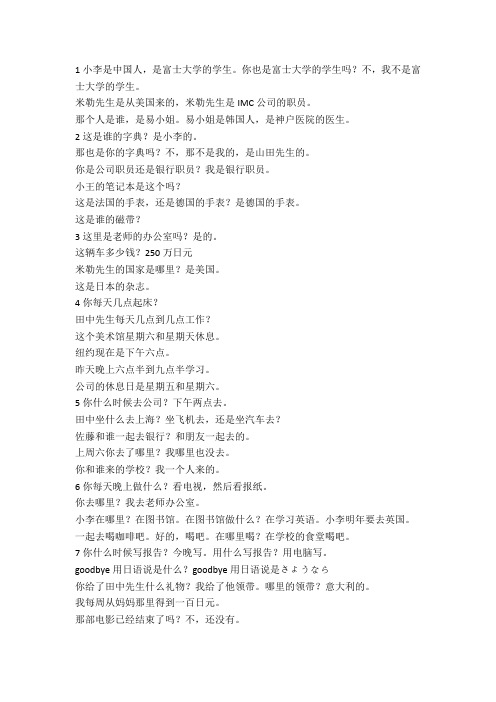
1小李是中国人,是富士大学的学生。
你也是富士大学的学生吗?不,我不是富士大学的学生。
米勒先生是从美国来的,米勒先生是IMC公司的职员。
那个人是谁,是易小姐。
易小姐是韩国人,是神户医院的医生。
2这是谁的字典?是小李的。
那也是你的字典吗?不,那不是我的,是山田先生的。
你是公司职员还是银行职员?我是银行职员。
小王的笔记本是这个吗?这是法国的手表,还是德国的手表?是德国的手表。
这是谁的磁带?3这里是老师的办公室吗?是的。
这辆车多少钱?250万日元米勒先生的国家是哪里?是美国。
这是日本的杂志。
4你每天几点起床?田中先生每天几点到几点工作?这个美术馆星期六和星期天休息。
纽约现在是下午六点。
昨天晚上六点半到九点半学习。
公司的休息日是星期五和星期六。
5你什么时候去公司?下午两点去。
田中坐什么去上海?坐飞机去,还是坐汽车去?佐藤和谁一起去银行?和朋友一起去的。
上周六你去了哪里?我哪里也没去。
你和谁来的学校?我一个人来的。
6你每天晚上做什么?看电视,然后看报纸。
你去哪里?我去老师办公室。
小李在哪里?在图书馆。
在图书馆做什么?在学习英语。
小李明年要去英国。
一起去喝咖啡吧。
好的,喝吧。
在哪里喝?在学校的食堂喝吧。
7你什么时候写报告?今晚写。
用什么写报告?用电脑写。
goodbye用日语说是什么?goodbye用日语说是さようなら你给了田中先生什么礼物?我给了他领带。
哪里的领带?意大利的。
我每周从妈妈那里得到一百日元。
那部电影已经结束了吗?不,还没有。
下周我们一起去看吧?好的,一起去看吧。
你在哪里遇到米勒先生的?在车站遇到的。
我从他那里得到了今晚的电影票。
8日本是一个漂亮的国家。
富士山是座高山。
琵琶湖的水很干净。
小李,你学习怎么样?虽然很忙,但是很快乐。
你已经习惯大学的生活了吗?是的,已经习惯了。
那本杂志如何?不太好。
上海非常热闹。
大阪怎么样?大阪也很热闹。
9你喜欢什么菜?我喜欢意大利菜。
小李懂日语吗?不太懂。
我一点也不喜欢日本。
